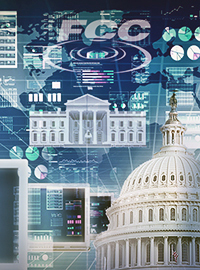| Chairman Ajit Pai Is Draining the FCC Swamp |
 |
|
By Timothy H. Lee
Thursday, April 20 2017 |
If you're wondering where the Washington, D.C., swamp is being drained as promised, look no further than the Federal Communications Commission (FCC) and intrepid new Chairman Ajit Pai. For eight long years, the Obama Administration circumvented our deliberative democratic process to impose laws via administrative fiat and his infamous "pen and phone." And no agency illustrated that malfeasance more than the FCC, where former Chairman Tom Wheeler in particular rammed through partisan policies and midnight regulations of dubious legality, often suffering the wrath of an unamused judicial branch for its shenanigans. Chief among those Obama FCC misdeeds was its relentless and ongoing effort to impose "Net Neutrality" regulatory control over the internet sector by reclassifying it as a "public utility" under laws enacted in the 1930s for copper-wire telephone lines. If that immediately leaves you perplexed about what part of the internet was so broken that it required the heavy-handed bureaucratic "fix" of reclassifying it as a public utility under Depression-era statutes, there's a very good reason for that. The internet wasn't broken. It had flourished and transformed our lives like no other innovation in human history. And that occurred precisely because administrations spanning two decades and both political parties, beginning with Clinton/Gore, wisely chose a "light touch" regulatory approach. But to the Obama Administration and the activist political left, "Net Neutrality" was never about fixing something that was broken. It was about extending government control over yet another sector of our economy, a realm of our lives that remained reasonably free of government micromanagement. In straightforward terms, "Net Neutrality" activists demand that all internet traffic be treated identically. That may sound harmless enough in the abstract. But in the real world, it jeopardizes internet service and the continuing innovation needed to address ever-increasing network traffic and capacity crunches. The problem, simply put, is that networks must possess enough latitude to devise innovative ways to maintain speed and service quality, which in turn can demand differentiating different types of traffic. To illustrate, Google's YouTube and Netflix alone now account for almost half of all North American internet traffic during peak periods. That obviously imposes enormous burdens upon finite network capacity, as a small number of internet users consume a disproportionate share of capacity to watch video and play video games. Accordingly, to ensure optimal service for the highest number of consumers, it's important that the market remain free enough that service providers can create ways to handle the crunch. But bandwidth hogs whose content traverses networks obviously don't like that idea. They want to remain free riders by forcing networks to treat them exactly the same as the small neighborhood restaurant that consumes very little bandwidth. Thus, "Net Neutrality" is like requiring moving companies to treat a studio apartment and a ten-bedroom mansion exactly the same. So proponents shamelessly resorted to crony capitalism to pursue that end, and alongside well-funded left-wing activist organizations, obtained outsized influence within the Obama Administration to impose their agenda. On two consecutive occasions, Obama's FCC attempted to impose Net Neutrality, only to be rejected both times by courts. So then Chairman Wheeler and his FCC chose another path: reclassify internet service providers as common carriers ("public utilities") under Title II of the Communications Act of 1934 instead of "information services" as they had been designated as since the 1996 Telecom Act. To sell their scheme to the public, activists and the Obama Administration alleged that unless the FCC stepped in and reclassified the internet, service providers would suddenly begin blocking websites and censoring the internet. Of course, they couldn't explain why service providers had curiously refrained from such widespread blocking for two decades while the internet grew. Nor could they explain how any service provider would possibly remain in business if consumers learned that it was blocking websites they sought to access. Nevertheless, Obama's FCC reclassified internet service under Title II, and confidently expected to pocket that achievement and advance their hyper-partisan regulatory agenda even further under a Hillary Clinton administration. But then fate intervened, and Donald Trump interrupted their march. Along with judicial appointments, tax policy and other regulatory issues, Trump immediately charted an alternative, more sensible course at the FCC by appointing free-market stalwart Ajit Pai as Chairman. Already, Chairman Pai is justifying his appointment by returning regulatory sanity and restoring a badly-needed "light touch" approach to the FCC. Reducing regulatory uncertainty and threat of government coercion will encourage private innovation and investment, with consumers ultimately enjoying the fruits of that investment and innovation as they have for over two decades of internet use. Meanwhile, the Federal Trade Commission (FTC), which is the superior federal agency regarding matters of consumer protection and market oversight, will regain powers improperly co-opted by the Obama FCC. But the far left and crony capitalists who benefited for eight years won't go down without a fight. They are extremely well-funded and well-connected at the federal level, so we can anticipate a predictable onslaught of scare tactics, hyperbole and dystopian fantasies in their effort to demonize Chairman Pai. Which makes it crucial that Americans who believe that the federal government has become too powerful and too arrogant support Chairman Pai and his commonsense reforms. People said they wanted the federal swamp drained. Now is our opportunity to prove it, and help Chairman Pai make it happen in one of the most important sectors of our economy and our lives. |
Related Articles : |
























